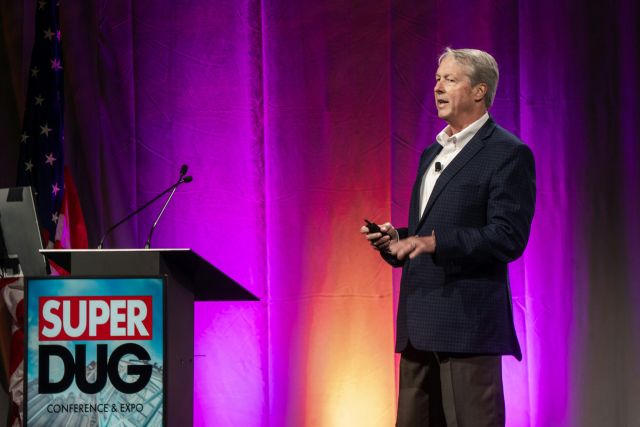
J. Marshall Adkins, Senior Managing Director, Head of Energy Investment Banking, Raymond James. (Source: Hart Energy)
FORT WORTH, Texas—The “keep it in the ground crowd” will likely be surprised to learn a coming boon to oil and natural gas producers is at least partially on them.
In fact, the 10-year outlook for the oil and gas industry has perhaps seldomly been better, J. Marshall Adkins, head of energy investment banking at Raymond James, said May 15 at Hart Energy’s SUPER DUG Conference & Expo.
Adkins market overview anticipates inflation to continue, which he argued is good for oil producers. Oil has historically “been the very best inflation hedge out there.” He noted that for the first time in his career, “you've got arguably one of the best investors in our lifetime buying E&P companies, investing in oil and gas.”
Over the next decade, oil will be a “phenomenal” industry to be in, he said.
“You're demonizing energy, you're regulating it and that's causing capital starvation. You starve a commodity industry of capital, you have less of that commodity, and everyone in this room knows oil demand is not going to end tomorrow or 18 months from now, as many of the politicians want to happen,” Adkins said.
Oil and gas consumption will continue rising for his lifetime, he said.
“When you start imposing policies like net zero [emissions], that creates opportunities, I think, in our business, that are long term,” he said.
While many models project Saudi Arabia will start ramping up production beginning in June, Adkins believes Saudi will wait until oil prices are above $90/bbl to start increasing output.
And while many say OPEC has about 5 MMbbl/d of excess capacity, he believes, based on tanker export data, that its spare capacity is closer to 1 MMbbl/d.
Adkins even sees strip prices moving to more than $100/bbl at some point this year.
Gas outlook: not so great for now
“On the natural gas side, it's going to suck this year. We’ve got too much gas, but demand is going to really start to kick in next year,” Adkins said.
Expected U.S. LNG capacity is expected to grow by about 4 Bcf/d by next year.
He said the natural gas outlook improves in 2025, partially due to surging demand for natural gas exports.
“I think people are underestimating the gas demand for power. So percentage wise, I actually think gas has more upside than oil over the next three years,” he said.
Two contributors to rising gas demand in the coming years are the push to “electrify everything,” and AI computing by data centers, he said.
“What I think the market is missing is the impact from AI,” he said. “You need a bunch of power to power these chips.”
He said Nvidia’s newest chips consume 14,500 watts/hour, or 14.5 kWh, and require another 150% of that wattage to keep its processing chips cool.
“You need 30 kWh plus to fuel just one chip that's being sold today from Nvidia,” Adkins said.
AI and data center power demand are expected to claim 60% of power growth from 2025 to 2030, he said.
Annual power demand in the U.S. is expected to grow by 2.75%, or about 14 GWh/yr, in 2025 and beyond, compared to about 0.6% annual growth before 2024, he said.
Even as U.S. policy promotes wind and solar, natural gas is poised to benefit from growing power generation demand.
In theory, wind and solar “should meet this demand.”
“But here's the dirty secret. As you put more solar on the grid, it causes negative power prices in the middle of the day,” he said. “Coal plants cannot turn off. So they have to pay people to keep producing. They're putting the coal business out of business.”
The result: a win for natural gas.
In short, he added, increasing solar and wind drops reliability of the U.S. grid system.
But he expects wind, solar and natural gas will expand while “coal goes away.”
He expects gas output will be “in a shortfall position” next year and that his math suggests gas prices of $7 or $8 next year.
“Bottom line, capital starvation and misguided ESG policies are going to crimp growth. This means we're in a good position from a price perspective on both oil and gas going forward to drive more activity in the U.S., and outperformance in our industry,” Adkins said.
Recommended Reading
Exclusive: Mesa Minerals IV to Reload in Haynesville, Permian, Other Basins
2025-03-19 - Mesa Minerals IV, backed by NGP funds, is launching to acquire mineral and royalty interests in the Permian and Haynesville, said Mesa President and CEO Darin Zanovich at DUG Gas.
Queen’s Chess: Changing the Rules
2025-02-28 - There’s a popular response to the inexplicable: “I don’t know. I don’t make the rules.” But what is known with certainty, as shown throughout history, is that we can change them.
Comments
Add new comment
This conversation is moderated according to Hart Energy community rules. Please read the rules before joining the discussion. If you’re experiencing any technical problems, please contact our customer care team.



